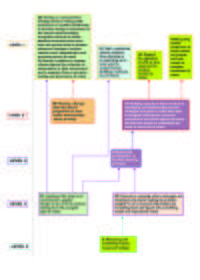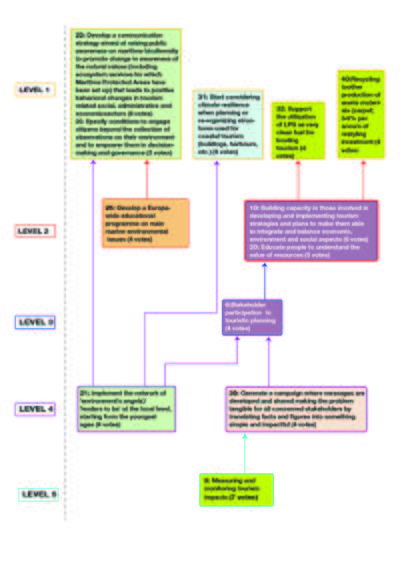Copenhagen International Mobilisation and Mutual Learning (MML) Workshop: Difference between revisions
(Created page with "{{SDD_Report <!-- The name of the template --> |acronym=MARINA <!-- Append to variable acronym the content acro...") |
No edit summary |
||
| (14 intermediate revisions by 2 users not shown) | |||
| Line 1: | Line 1: | ||
{{SDD_Report | {{SDD_Report | ||
|acronym=MARINA | |acronym= MARINA | ||
|book_image=MARINA_IntMML_Clusters_MAP_Venice_MAP.jpg | |book_image=MARINA_IntMML_Clusters_MAP_Venice_MAP.jpg | ||
|report_title= [[Copenhagen International Mobilisation and Mutual Learning (MML) Workshop]] | |report_title= [[Copenhagen International Mobilisation and Mutual Learning (MML) Workshop]] | ||
|Triggering_Question= "What networks and actions of innovation and research are necessary to ensure that coastal cities prosper and benefit from sustainable tourism and at the same preserve their cultural, environmental and social inclusionary qualities?" | |project= [[MARINA]] | ||
| | |Triggering_Question= "What networks and actions of innovation and research are necessary to ensure that coastal cities prosper and benefit from sustainable tourism and at the same preserve their cultural, environmental and social inclusionary qualities?" | ||
|total_duration=8 person hrs | |location= Copenhagen | ||
|stats=Participants=15 <br> Number of ideas=33 <br>Number of Clusters=5 <br> Ideas received Votes=23 <br> Ideas on MAP R=12 | |dates= 30th May 2017 | ||
| | |LeadFacilitator=[[Yiannis Laouris]] | ||
| | |AsFacilitator=[[Kevin Dye]] | ||
|author=[[Yiannis Laouris]] | |||
|editor=[[Fernando Ferri]] | |||
|total_duration= 8 person hrs | |||
|stats= Participants=15 <br> Number of ideas=33 <br>Number of Clusters=5 <br> Ideas received Votes=23 <br> Ideas on MAP R=12 | |||
|isbn= | |||
|link=[[Media:M_WP3_Report_Int_MML_Copenhagen_Sustainable_tourism.pdf |Download Report]] | |||
}} | }} | ||
| Line 16: | Line 22: | ||
==Executive Summary== | ==Executive Summary== | ||
The Copenhagen International Mobilisation and Mutual Learning (MML) Workshop entitled "Sustainable tourism in coastal areas: The challenge of urbanisation" was organized by the [[Aalborg University]] and [[CNTI] in the context of the project [[MARINA]], funded by the European | The Copenhagen International Mobilisation and Mutual Learning (MML) Workshop entitled "Sustainable tourism in coastal areas: The challenge of urbanisation" was organized by the [[Aalborg University (AAU)]] and [[Cyprus Neuroscience and Technology Institute|CNTI]] in the context of the project [[MARINA]], funded by the European Union’s Horizon 2020 Research and Innovation Programme, on May 30th 2017 in Copenhagen, Denmark. | ||
The workshop is one of the 34 European MMLs that will be conducted by the [[MARINA]] project partners all over Europe, as well as the | The workshop is one of the 34 European MMLs that will be conducted by the [[MARINA]] project partners all over Europe, as well as the third of the eight international workshops that will be conducted European cities between 2017 and 2018. The goal of the MML workshops is to create common visions, engage stakeholders to decide on common action plans on important marine issues related to the European Blue Growth Strategy, which will be exploited as policy recommendations on a national and European levels. In addition, the results of the workshops will provide input for the roadmap of Responsible Research and Innovation good practice as well as recommendations about embedding the RRI in the policy-making processes. The results will be assembled in a comprehensive report that will be submitted to the Directorate-General for Research and Innovation of the European Commission. | ||
The Copenhagen International MML workshop brought together fifteen (15) participants from the public and private sectors, NGOs, citizens and local authorities interested in issues concerning the topic under discussion. | The Copenhagen International MML workshop brought together fifteen (15) participants from the public and private sectors, NGOs, citizens and local authorities interested in issues concerning the topic under discussion. | ||
| Line 41: | Line 47: | ||
* Action #6: (3 votes) Dedicated science-policy interface of sustainable tourism | * Action #6: (3 votes) Dedicated science-policy interface of sustainable tourism | ||
The workshop was facilitated by [[Yiannis Laouris]] and [[Kevin Dye]] | |||
The workshop was facilitated by [[Yiannis Laouris]] and [[Kevin Dye]]. | |||
==Multi-Parameter Scoring== | |||
At the end of the SDD, [[Yiannis Laouris|Laouris]] and [[Kevin Dye|Dye]] conducted an experiment. They requested from the participants to evaluate the factors that made it to the Influence Map, for the following parameters (Likert 1 to 5): | |||
# Impact | |||
# Feasibility | |||
# Probability of happening without intervention | |||
The theoretical grounding is that a high difference between the averaged scores for Impact and Probability for a particular idea is interpreted that, according to the participating stakeholders, the specific idea has high impact, but it will not happen unless the relevant stakeholders take targeted actions, i.e., low probability to happen without new intervention. This knowledge helps systems designers to produce more effective road maps, by focusing their efforts on actions that will not happen otherwise, ''and'' they have high impact. Next, they checked the feasibility of ideas that turn out to have high priority based on the previous analyses and promote those that are easier to implement (i.e., higher score in feasibility). The purpose of this experiment was to combine these scores with the influence weights provided by the Influence Maps to produce more effective road maps. | |||
==Communication Material== | |||
*[[Media:Copenhagen_Program.pdf|Copenhagen MML Program]] | |||
==Report== | |||
*[[Media:M_WP3_Report_Int_MML_Copenhagen_Sustainable_tourism.pdf|Copenhagen MML Report]] | |||
| Line 63: | Line 87: | ||
[[Category:Projects with SDD]] | [[Category:Projects with SDD]] | ||
[[Category: SDDP Reports]] | [[Category: SDDP Reports]] | ||
Latest revision as of 03:05, 25 September 2022
|
Executive Summary
The Copenhagen International Mobilisation and Mutual Learning (MML) Workshop entitled "Sustainable tourism in coastal areas: The challenge of urbanisation" was organized by the Aalborg University (AAU) and CNTI in the context of the project MARINA, funded by the European Union’s Horizon 2020 Research and Innovation Programme, on May 30th 2017 in Copenhagen, Denmark.
The workshop is one of the 34 European MMLs that will be conducted by the MARINA project partners all over Europe, as well as the third of the eight international workshops that will be conducted European cities between 2017 and 2018. The goal of the MML workshops is to create common visions, engage stakeholders to decide on common action plans on important marine issues related to the European Blue Growth Strategy, which will be exploited as policy recommendations on a national and European levels. In addition, the results of the workshops will provide input for the roadmap of Responsible Research and Innovation good practice as well as recommendations about embedding the RRI in the policy-making processes. The results will be assembled in a comprehensive report that will be submitted to the Directorate-General for Research and Innovation of the European Commission.
The Copenhagen International MML workshop brought together fifteen (15) participants from the public and private sectors, NGOs, citizens and local authorities interested in issues concerning the topic under discussion.
The Triggering Question (TQ) of the workshop was:
"What networks and actions of innovation and research are necessary to ensure that coastal cities prosper and benefit from sustainable tourism and at the same preserve their cultural, environmental and social inclusionary qualities?"
In response to the TQ, the 15 participants came up with 33 ideas, which were categorized in 5 clusters. Following the voting process, 23 ideas received one or more votes and were structured to create the influence MAP shown below.
According to the participants of this workshop, the ideas that appear to be the most influential were:
- Action #7: (7 votes) Indicator Systems
- Action #4: (5 votes) Combined efforts of the government, regional government and tourism
- Action #21: (4 votes) Effective instruments/frameworks for assessing environmental and cultural degradation as a result of tourism activities
- Action #6: (3 votes) Dedicated science-policy interface of sustainable tourism
The workshop was facilitated by Yiannis Laouris and Kevin Dye.
Multi-Parameter Scoring
At the end of the SDD, Laouris and Dye conducted an experiment. They requested from the participants to evaluate the factors that made it to the Influence Map, for the following parameters (Likert 1 to 5):
- Impact
- Feasibility
- Probability of happening without intervention
The theoretical grounding is that a high difference between the averaged scores for Impact and Probability for a particular idea is interpreted that, according to the participating stakeholders, the specific idea has high impact, but it will not happen unless the relevant stakeholders take targeted actions, i.e., low probability to happen without new intervention. This knowledge helps systems designers to produce more effective road maps, by focusing their efforts on actions that will not happen otherwise, and they have high impact. Next, they checked the feasibility of ideas that turn out to have high priority based on the previous analyses and promote those that are easier to implement (i.e., higher score in feasibility). The purpose of this experiment was to combine these scores with the influence weights provided by the Influence Maps to produce more effective road maps.
Communication Material
Report

